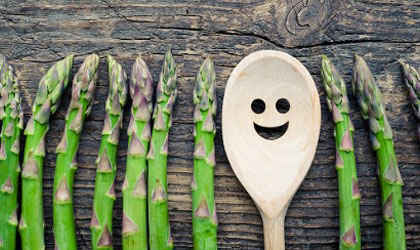
The teens are marked by ‘firsts’. Many of these ‘firsts’ are wildly fun and exhilarating; others, however, can be emotionally testing. If the ever-growing burden of academia, school life and friendships weren’t enough to muddle through, your teenage daughter also contends with puberty, problematic skin and PMS. The wider societal pressures to look a certain way may further compromise wellbeing, giving rise to anxiety and body dysmorphia.
Though teen years are heralded as some of the best moments of our lives, there’s no doubt they can be hard. Menstruation, mood swings, self-esteem issues, peer pressure, social media – teenagers go through it all, fast. While they may be rebelling against you in an attempt to assert their independence, there’s still plenty you can do to support them from the side-lines. Remember, your teen is facing extraordinary physical, emotional, hormonal and social upheaval right now. Beyond ensuring their diet caters for the needs of their growing body – packing it with plenty of protein, iron, and essential fatty acids – it’s important to remain their biggest cheerleader. You need to be there when strict diets, anxiety and feelings of overwhelm start to trickle in.
Eating Habits
As your children ushers in their teen years, more emphasis is placed on their appearance and body image. They may entertain the idea of dieting or meticulously limit their intake of certain food groups. But these precious years are characterized by critically important growth and development. Your teens needs all the nourishment they can get. Now isn’t the time to count calories or start an unscrupulous detox. Indeed, your average teenage boy (14-18 years) requires around 2,200- 3,200 calories daily. And if your son is very active or plays sport, he may need a staggering 3,500- 4,000 calories each day.
Discourage Dieting
Discourage dieting Because we live in a society that celebrates the ‘thin-ideal’, teens are increasingly turning to rigid diets to emulate celebrities, models and influencers on social media. But this isn’t healthy or safe. Cutting out food groups, like fats and carbohydrates, may deprive them of the vital nutrients needed to balance hormone levels during puberty. Try to discourage dieting. And if you notice restrictive, anti-social or obsessive behaviour, it may signal your teen needs support.
Don’t Skip Breakfast
Newsflash: skipping breakfast doesn’t aid weight loss. Teenagers may think they are saving on calories by heading to school hungry, but it may have the opposite effect. Failing to eat breakfast can trigger serious hunger cravings, often leading to binging later in the day. Bypassing breakfast can also compromise academic performance, energy levels and mood. Ensure your teen has a protein-packed breakfast every day. Eggs, porridge or Greek yoghurt are nutrient-dense options.
Choose Carbs Wisely
Carbs provide energy. That’s why your teen loves them. But not all carbs are created equal; your teen needs to choose them carefully. Simple carbohydrates – pizza, pies and pastries – may be tempting, but they have minimal nutritional value. Instead, the focus should be on complex carbohydrates – brown rice, whole-wheat pasta, oats and vegetables – thanks to their high fibre content and slow-releasing energy properties.
Slash Sugar
Did you know your son’s ‘innocent’ fizzy drink contains a shocking 4-6 teaspoons of sugar? Ready meals aren’t any better. Though teens don’t take too well to lectures, try to advocate nutritious home-cooking and sugar-free drinks. Oh, and dates, dark chocolate and fruit are far better choices to satisfy his sweet tooth.
Pack In Protein
Protein is a hard-working, industrious nutrient. It plays an essential role in the development and repair of tissues and muscles. To support growth spurts often experienced by teens, your child needs around 52 grams of protein daily. Meat, dairy, fish, beans, lentils, eggs, nuts and seeds are all rich sources. Top tip: add whey or pea protein powder to supercharge the nutritional content of soups, stews and smoothies.
Invest In Bone Nutrition
Did you know the greatest period of bone development happens during adolescence? Impressively, as much bone is formed in the two years surrounding a girl’s first menstrual cycle as is lost in the last four decades of her life. (1) Calcium and vitamin D are central to bone health. Besides increasing the calcium content of meals with sardines, tofu and kale, ensure your children spend enough time outdoors to safely synthesise vitamin D.
Increase Iron And Magnesium
Your daughter’s teen years are also marked by the onset of menstruation, which can throw up its challenges. Each month, your daughter will lose iron-containing blood. Heavy periods can deplete iron stores and may increase the risk of anaemia, causing fatigue and lethargy. To mitigate this risk, ensure your daughter has a plentiful intake of dietary iron and magnesium. Dark green leafy veggies, beans, nuts and lean red meats are rich sources. Bonus: magnesium supports the reduction of tiredness and fatigue, as well as contributing to normal psychological function, making it a teen must-have.
Vitamin B6
Teenage turmoil is no joke. Dealing with raging hormones against a backdrop of academic pressures, new romantic feelings, and, well, spots can be emotionally and physically draining for your daughter. Vitamin B6 is one to consider. This nutrient contributes to the regulation of hormonal activity (3).
Calcium
Has your teen shot up in recent months? Adolescence is characterised by its rapid growth and development. Did you know around 35% of an adult’s peak bone mass is attained during adolescence? Calcium’s bone-friendly reputation isn’t a big secret. To support the normal bone health of your teen, ensure she gets enough calcium daily (the NRV is 1300mg).
Vitamin D
Like calcium, the ‘sunshine nutrient’ is also praised for its role in bone health. Put simply, your teen’s calcium and vitamin D intake must be adequate to fully realise the impact of each nutrient on their bones. Up to 25μg a day is often recommended to maintain normal bone health.
Myo-Inositol
Little-known but remarkably powerful, myo-inositol has a similar structure to glucose and plays an essential role in the body’s communication with cells. Some of its purported benefits include general nerve support as well as supporting specific female health issues. (4) Most sources suggest a dose of 4 grams for specialist purposes. Suitable from 16 years.
Chromium
Hormonal surges and PMS will make teenagers at you out of house and home. Chromium contributes to the maintenance of normal blood glucose levels, which may help to curb cravings. Indeed, research suggests chromium has an important relationship with insulin, the hormone secreted by the pancreas to balance blood sugar levels (5).
Vitamin B12
Veganism is all the rage these days, with increasing numbers of young people turning to plant-based diets to support their health, the environment and animal welfare. However, the biggest concern with veganism is the repercussions of eliminating main food groups. By cutting out meat and dairy, your teenager runs the risk of falling short in vitamin B12. That’s why supplementation is so essential.
Cinnamon
Herbalists have known about the impressive spice, cinnamon, for 4,000 years. Traditionally used to calm digestive problems, cinnamon has recently been the focus of research revealing it may also help the body balance its energy reserves between meals. Just the ticket for that insatiable teenage appetite.
Zinc
Most teenagers can attest to the frustrations of oily skin and zits. But spots don’t have to be a fact of life for your teen. There’s growing data to suggest zinc may support a healthy complexion. (6) Better still, zinc helps maintain normal function of the immune system.
Omega 3
Beyond the hormonal changes, new relationships and rebellions, teen years are also defined by exam stress and academic pressures. Needless to say, memory and concentration are crucial at this stage. Found in oily fish, EPA and DHA are essential fatty acids which contribute to normal brain function, making a helpful addition to your daughter’s arsenal. Encourage your daughter to eat 2-3 servings of oily fish a week, such as salmon or mackerel.
Mental & Hormonal Health
Regulate Hormonal Health
As the parent of a teenage girl, you know she can be a force of nature. Minor annoyances can turn into emotional earthquakes. Aside from mood swings and irritability, your daughter may also experience bloating, headaches and stomach cramps before her period. The culprit? Hormones. Studies show that vitamin B6 contributes to the regulation of hormonal activity, so you may want to add this to her diet (2).
Banish Breakouts
Zit, spots, acne – whatever they call their pimples, problematic skin is no fun at all. Beyond being painful, breakouts can compromise self-esteem, confidence and mental health, especially when appearance feels like everything at this age. Dissuade your child from using harsh topical treatments that strip the skin and lead to dryness. Instead, invest in a tea tree oil preparation to gently dab on their blemishes. Increasing their dietary intake of vitamin A and zinc will further support skin health. Boys are more susceptible to breakouts thanks to higher levels of testosterone. Young men may need coaxing to maintain a healthy skin regime. Encourage him to follow a cruelty free skincare regime aimed at blemish control.
Acknowledge Body Dysmorphia
Thanks to the rise of modern technology, teenagers are more connected than ever. But the omnipresence of social media, screen use and influencer-culture can have a pernicious effect on body image. If your teen seems overly preoccupied with their weight and appearance, you may need to intervene. Patiently teach them everyone is unique and beautiful; no one body looks the same. Explain the images plastered on billboards, TV, and social media are the products of heavy editing. Encourage them to scope out portrayals of ‘real’ men and women.
Address Anxiety
Hormonal changes, exams, societal expectations, turbulent friendships – all put pressure on your teenagers and can lead to anxiety. Above all, it’s important to acknowledge and validate their concerns – don’t ignore or dismiss them. Invite them to open up to you, and normalise discussions about mental health. Embolden them to create a toolbox of helpful strategies to manage their mood: journaling, regular exercise and meditation.
Oversee Social Media
As your teen becomes more tech-savvy, you need to maintain a vigilant sense of their security online: establish an age limit for them to start using social media; regularly check their privacy settings; ensure their profile is private, and set healthy guidelines for their social media use.
References:
-
Dorn B et al., Longitudinal Impact of Substance Use and Depressive Symptoms on Bone Accrual Among Girls Aged 11–19 Years. Journal of Asolescent Health. 2012;52(4):393-399.
-
Wyatt. K. et al., Efficacy of vitamin B-6 in the treatment of premenstrual syndrome: systematic review. BMJ. 1999;318(7195):1375-1381.
-
Inositol M., Miscarriage Research - Inositol. Retrieved 30 March 2020..Available online: https://sites.google.com/site/miscarriageresearch/ supplements-and-miscarriage/d-chiro-inositol
-
Hua Y et al., Molecular mechanisms of chromium in alleviating insulin resistance. The Journal of Nutritional Biochemistry. 2012;23(4):313-319.
-
Decker A et al., Over-the-counter Acne Treatments. The Journal Of Clinical And Aesthetic Dermatology. 2012;5(5):32-40.
Related Posts
Disclaimer: The information presented by Nature's Best is for informational purposes only. It is based on scientific studies (human, animal, or in vitro), clinical experience, or traditional usage as cited in each article. The results reported may not necessarily occur in all individuals. Self-treatment is not recommended for life-threatening conditions that require medical treatment under a doctor's care. For many of the conditions discussed, treatment with prescription or over the counter medication is also available. Consult your doctor, practitioner, and/or pharmacist for any health problem and before using any supplements or before making any changes in prescribed medications.

Keri
Keri Filtness has worked in the Nutrition Industry for 19 years. She is regularly called upon for her professional comments on health and nutrition related news. Her opinions have been featured by BBC3, Prima, Vitality, The Mirror, Woman’s Own and Cycling Weekly, amongst others. She has also worked one to one with journalists, analysing their diets and health concerns and recommending changes and additions, where appropriate.
View More



